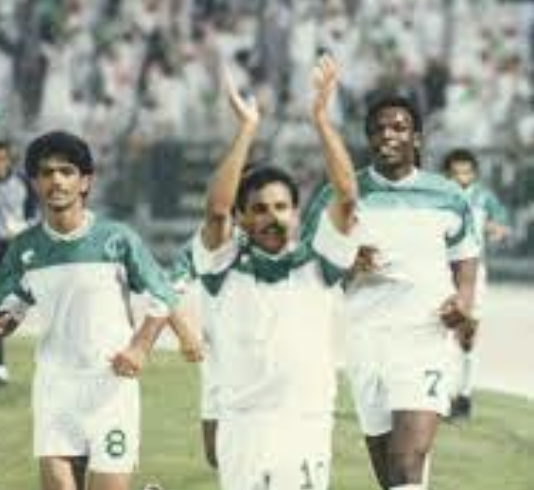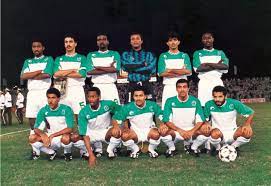The 1988 AFC Asian Cup saw the continued dominance of the competition by West Asian nations, with seven of the 10 qualifying teams coming from West Asia, including the defending champions and the hosts, with the tournament coming to Qatar for the first time.
1988 Asian Cup
Winner: Saudi Arabia
Runner-up: South Korea
Hosts: Qatar
Saudi Arabia returned to defend their title after their success in Singapore in 1984, and eight teams would join them after the four-group qualifying tournament, which saw just four withdrawals and 20 teams entering.
Group 1 took place in the United Arab Emirates and saw the two undefeated teams qualify as the UAE won convincingly against Bangladesh, India, North Yemen and Thailand, with China PR the only team to keep them out, a goalless draw the final result there.
China PR won just two of the five games, but crucially didn’t lose any games and qualified, just ahead of North Yemen, who were hampered by winning just one game and a narrow loss to the UAE.
In Group 2, Iraq pulled out beforehand, leaving Japan, Jordan, Kuwait, Pakistan and hosts Malaysia to battle it out for the two places. 1980 champions Kuwait continued their qualifying tradition with an undefeated qualifying campaign as three wins and a draw helped them finish top.
Japan and Jordan battled it out for the final place, with Japan clinching it on goal difference after beating Pakistan 4-1 in the final match of the competition. It was a bitter blow to Jordan, who had gone undefeated throughout the competition but, as with North Yemen, they drew too many games and missed out by just two goals.
Group 3 hailed for the Nepalese capital Kathmandu and saw Hong Kong, Iran, Nepal, North Korea and Syria in action. Syria followed in the footsteps of Kuwait and UAE to win the group without defeat, sealing qualification with a 2-0 win over Hong Kong, while Iran made it to Qatar with a Karin Bavi hat-trick sealing a win against Nepal, with North Korea just missing out on qualification.
Their Southern neighbours were more successful in Group 4 as after Burma and Oman withdrew beforehand, they finished second behind Bahrain on goal difference after a 4-0 win over Indonesia put the hosts out. Bahrain topped the group undefeated, including a 2-0 win over the South Koreans.
The Al-Ahly Stadium and Qatar SC Stadium in Doha were selected to host 16 days of tournament action, with tournament hosts Qatar taking on Iran. The 2-0 defeat was a precursor for how their tournament would go, with wins over the two teams that finished below them, UAE and Japan, but a defeat by group winners by South Korea ended their tournament.
Iran, previous winners of the tournament, but with the country still reeling from the effects of the Iran-Iraq war, were able to get through the group stage, but didn’t look as convincing as previous tournaments, drawing 0-0 against Japan and just getting past UAE, before a 3-0 defeat by South Korea meant second place and a more difficult semi-final place.
The Koreans were the dominant team in Group A, starting with a 1-0 win against the UAE, then going on to three more wins for a perfect record that saw them top the group and establish themselves as the team to beat.
For UAE, the tournament was a case of so near, yet so far, as they lost by just the odd goal to South Korea, Iran and Qatar before a late Mohammed goal brought them a 1-0 win over Japan to finish fourth.
Japan, who were just starting the development of the game at all levels, struggled in their first Asian Cup, exiting bottom of the group with three defeats and no goals scored, but the draw against Iran was encouraging for the future.
Group B saw the holders emerge undefeated, but also saw the lesser lights of Asian football threaten a surprise.
Saudi Arabia started the tournament with a clinical 2-0 win over Syria, but they then struggled to break down the Kuwaitis in a goalless stalemate and had to come from behind to avoid a shock defeat against Bahrain. They managed to win the group with a 1-0 win over China PR, but they would need to find more solid form to retain their championship.
China PR had already qualified before the Saudi Arabia game, having put away Syria and Bahrain and grabbed a late draw with Kuwait to clinch qualification, but the defeat by the Saudis put them into the tougher semi-final with South Korea.
Syria came third in the group, but their earlier defeats by Saudi Arabia and China PR meant that everything afterwards was damage-limitation as they beat Kuwait and Bahrain 1-0.
For the Kuwaitis and the Bahrainis, an inability to win a match halted any further progress as three draws for Kuwait and two for Bahrain saw them go home disappointed.
The semi-finals saw South Korea face China PR and Saudi Arabia take on Iran.
The first Semi-final saw the Chinese take the field as underdogs against a very strong Korean team. Despite this, they faced up to the challenge and kept the Korean attack at bay for the full 90 minutes as the game went to extra-time goalless.
The deadlock was finally broken just three minutes into extra time when Lee Tae-Ho tapped in front close range after Cho Min-kook stole in from a missed defensive header and fired a low cross over.
China PR fought back and levelled up with a Mai Chao header, but South Korea were not to be denied and Lee Tae-Ho’s finish from close range proved enough to keep Korean hopes of a first Asian Cup since 1960 alive.
The other Semi-final was just as tense as Arabian rivals Iran and defending champions Saudi Arabia fought for the other final spot. Chances were at a premium as the past and present dominant forces of the Asian game clashed, with Majeh Ahmed Abdullah scoring the only goal after ghosting in to head home.
That turned out to be the last goal of the tournament as first Iran and China PR played out a dull goalless draw in the Third-place playoff, with Iran winning 3-0 on penalties.
A day later, neither the top team from the East in South Korea, nor the top team from the West in Saudi Arabia could find a way through.
This left the game goalless after 120 minutes and the first Asian Cup to be decided by a penalty shoot-out. With so much at stake, nerves inevitably took hold, with the woodwork denying Cho Mon-Kook for South Korea and Abd Al-Jawad for Saudi Arabia.
With the scores at 3-3, Abdullah Al-Deayea made himself a hero when he guessed right and palmed Cho Yoon-Hwan’s penalty on to the post, leaving Al-Bishi to slot home the winning penalty and retain the Asian Cup for the ecstatic Saudis.


